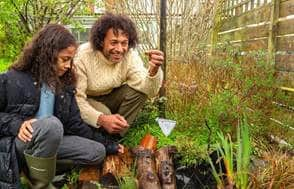How to create your own garden or balcony wetland to combat habitat loss
and live on Freeview channel 276
According to the Wildlife Trusts, the UK has lost 90% of its wetland habitat in the last 100 years with 10% of freshwater and wetland species threatened with extinction.
Reasons for the loss include draining of land for urbanisation and agriculture, extraction of natural water resources and the damming of rivers to create reservoirs.
Advertisement
Hide AdAdvertisement
Hide AdNo matter what the scale, Washington Wetland Centre manager Gill Pipes is urging everyone to play their part in rectifying the situation.
She said: “Nature needs all the help we can provide at the moment and one of the best ways of helping at home is by creating a mini-wetland.
“Wetlands support more life than any other habitat on earth and it’s something we can all get involved in - and more easily than you realise.
“People automatically think they need a big space to create a large pond but there are so many options for small areas, such as buckets, drainpipe wetlands and balcony ponds – which can be incredibly beneficial for countless species; from beetles to birds.
Advertisement
Hide AdAdvertisement
Hide Ad“And not only is it great for the species you’re helping, but having your very own wetland also offers you a fascinating insight into a world you don’t often see, quite literally on your doorstep.”


As well as creating natural habitats for creatures to live in, mini wetland areas, whatever the size, can also provide a place for wildlife to drink and cool down.
To help people in their quest, the Wildfowl and Wetlands Trust, of which Washington is a part, has created a video and guide showing how people can create their own wetland environment including ponds, drainpipe wetlands and even a bucket or dish on a balcony.
Mini wetland habitats can attract frogs, dragonflies and an array of birds.
For children to find out more about wetland habitats, Washington Wetland Centre is hosting pond dipping events across the summer holidays.
Further details can be found on the centre’s website.
Comment Guidelines
National World encourages reader discussion on our stories. User feedback, insights and back-and-forth exchanges add a rich layer of context to reporting. Please review our Community Guidelines before commenting.